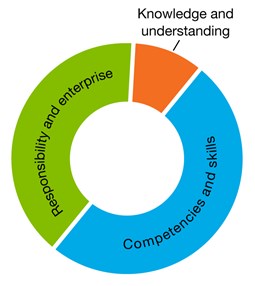Explore content
7-10 Civics and Citizenship
The Australian Curriculum: Civics and Citizenship is uniquely positioned to develop consumer and financial literacy in young people. The Civics and Citizenship curriculum supports the development of the dimensions of consumer and financial literacy as shown in the diagram below.

Approximate proportion of dimensions addressed in 7-10 Civics and Citizenship
Students develop enterprising skills in Civics and Citizenship through initiating and participating in student investigations and community activities. They learn to work productively with others towards common goals and develop the ability to plan and act for the benefit of the community, such as fundraising events. They also consider and develop an appreciation for the role that values play in the decisions that people and groups make and the importance of values to particular identities. These understandings and dispositions provide a platform for students to become active and informed citizens, to consider the consequences of their financial and consumer choices and to appreciate that there is often no one right consumer or financial decision because such decisions depend on individual circumstances, preferences and values.
Becoming responsible consumers and financially literate citizens is underpinned by the range of competencies and skills students develop through studying Civics and Citizenship. Students learn to evaluate information and ideas, assess the impact of the media in shaping identities, and communicate arguments using appropriate language and conventions. These skills can be applied to a range of consumer and financial real-world contexts, such as evaluating and communicating how the media, including social media, influence consumer behaviour.
The development of consumer and financial literacy in Civics and Citizenship is supported by the understanding students develop about how government policy, such as economic policy, is shaped, how government policies reflect budgetary constraints, how statute laws such as tax law and employment law are made, and the role and responsibilities of the Australian Government in the global context.
Tax, Super and You provides a number of interdisciplinary units and interactive activities that include aspects of the Civics and Citizenship curriculum. Access a list of relevant resources that link to the Australian Curriculum: Civics and Citizenship using the right-hand menu.
Years 7-10 - Tax 101: Activity 1 – What is tax and why do we need it?
Years 7-10 Tax 101: Activity 2 – Tax: Who, what, how and why
Years 7-10 Tax 101: Activity 3 – How is tax revenue spent?
Years 7-10 Tax 101: Activity 4 – The Budget: taxes and spending
Years 7-10 Tax 101: Activity 5 – History of tax in Australia
Years 7-10 Your Tax: Activity 1 – Income and income tax
Years 7-10 Your Tax: Activity 5 – What other taxes do I have to pay?
Years 7-10 Your Tax: Activity 6 – Fixing a tax problem
Years 7-10 Business Tax: Activity 5 – The goods and services tax (GST)
Years 7-10 Interactive: The story of tax
Years 7-10 Interactive: Shaping the system
Years 7-10 Interactive: Tax in your community
The process through which government policy is shaped and developed, including the role of Prime Minister (ACHCK103)
The influence of a range of media, including social media, in shaping identities and attitudes to diversity (ACHCK080)
Analysis, synthesis and interpretation
Critically evaluate information and ideas from a range of sources in relation to civics and citizenship topics and issues (ACHCS084)
Account for different interpretations and points of view (ACHCS085)
Communication and reflection
Present evidence-based civics and citizenship arguments using subject-specific language (ACHCS088)
Problem-solving and decision-making
Recognise and consider multiple perspectives and ambiguities, and use strategies to negotiate and resolve contentious issues (ACHCS086)
Use democratic processes to reach consensus on a course of action relating to a civics or citizenship issue and plan for that action (ACHCS087)
Knowledge and understanding
How and why individuals and groups, including religious groups, participate in and contribute to civic life (ACHCK079)
Questioning and research
Develop, select and evaluate a range of questions to investigate Australia’s political and legal systems (ACHCS082)
Identify, gather and sort information and ideas from a range of sources and reference as appropriate (ACHCS083)
Communication and reflection
Reflect on their role as a citizen in Australian, regional and global contexts (ACHCS089)

